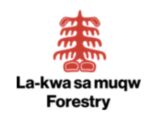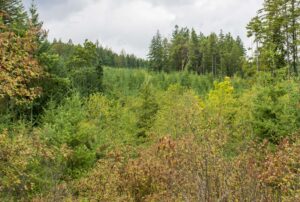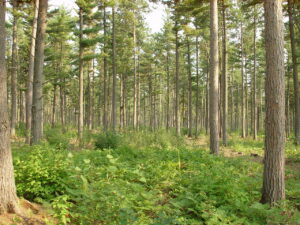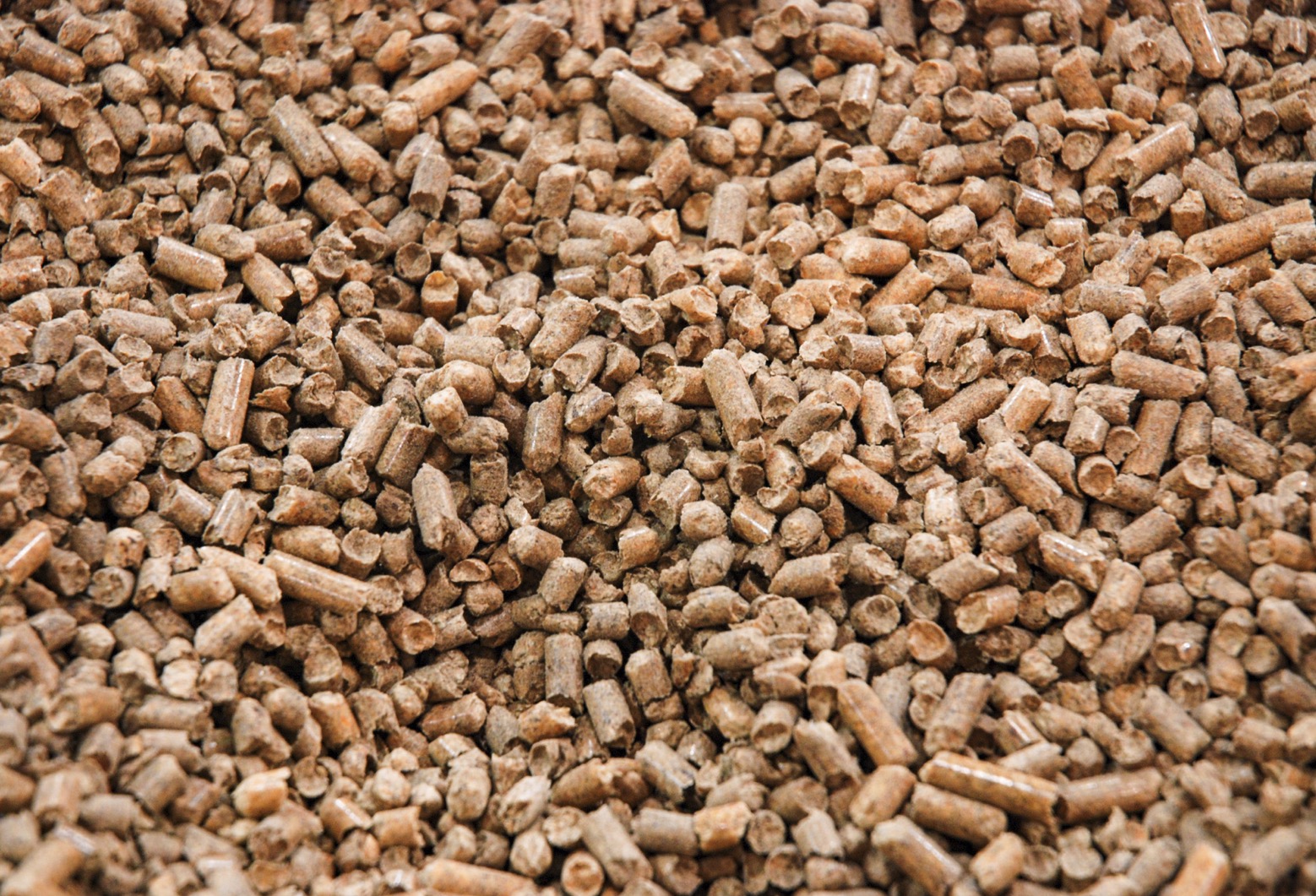 Ottawa’s Budget 2025 set aside $1.25 billion to retool Canada’s softwood industry. In related news: the United Steelworkers see progress; Ontario wood manufacturers welcome the support; BC seeks buyers in Asia; and a new report says Trump’s lumber self-sufficiency goal is unrealistic. Meanwhile: Drax retains UK support for wood pellets; CPKC announces new labour agreements, and Canfor (-$172M), Cascades ($29M), Rayonier ($43M), and LP ($9M) report their Q3, 2025 earnings.
Ottawa’s Budget 2025 set aside $1.25 billion to retool Canada’s softwood industry. In related news: the United Steelworkers see progress; Ontario wood manufacturers welcome the support; BC seeks buyers in Asia; and a new report says Trump’s lumber self-sufficiency goal is unrealistic. Meanwhile: Drax retains UK support for wood pellets; CPKC announces new labour agreements, and Canfor (-$172M), Cascades ($29M), Rayonier ($43M), and LP ($9M) report their Q3, 2025 earnings.
In Forestry/Climate news: forest resilience takes centre stage, as the UN’s COP30 climate summit kicks off in Brazil; Asia-Pacific forestry leaders meet on forest health; Google strikes a forest carbon deal in Brazil; and Interpol fights illegal deforestation. Meanwhile: BC’s forest critic speaks out; and the latest from the Forest Genetics Council of BC.
Finally, drink Red Legged Ale and save Oregon’s Northern Red-Legged Frogs.
Kelly McCloskey, Tree Frog News Editor
 On August 5, 2025,
On August 5, 2025,  TORONTO – United Steelworkers union (USW) National Director Marty Warren issued the following statement on the federal Budget 2025: This budget recognizes something workers have been saying for years. Canada needs to build more at home and expand its industrial capacity. The commitments on Buy-Canadian procurement, industrial strategy and trade enforcement are important steps forward and reflect priorities Steelworkers have been advocating for across the country. There are meaningful investments in steel, forestry, critical minerals and manufacturing – sectors that support thousands of good union jobs and anchor regional economies and communities. We welcome tools that can help stabilize supply chains and strengthen domestic production. …Buy-Canadian rules must be enforced, industrial dollars must translate into real jobs and production on the ground, and forestry and industrial communities need long-term certainty, not temporary relief. We see steps in the right direction. Now it’s about follow-through.
TORONTO – United Steelworkers union (USW) National Director Marty Warren issued the following statement on the federal Budget 2025: This budget recognizes something workers have been saying for years. Canada needs to build more at home and expand its industrial capacity. The commitments on Buy-Canadian procurement, industrial strategy and trade enforcement are important steps forward and reflect priorities Steelworkers have been advocating for across the country. There are meaningful investments in steel, forestry, critical minerals and manufacturing – sectors that support thousands of good union jobs and anchor regional economies and communities. We welcome tools that can help stabilize supply chains and strengthen domestic production. …Buy-Canadian rules must be enforced, industrial dollars must translate into real jobs and production on the ground, and forestry and industrial communities need long-term certainty, not temporary relief. We see steps in the right direction. Now it’s about follow-through.


 Campbell River, BC — La-kwa sa muqw Forestry Limited Partnership (LKSM) is ready to sit down at the bargaining table with the USW at any time, and has been ready throughout this strike, which it has made clear many times to the USW. However the USW has repeatedly refused to do so, as recently as October 24. Despite repeated invitations from LKSM, the USW has also declined both meaningful negotiations and mediation to assist the bargaining process, unnecessarily prolonging this months-long strike. “LKSM’s First Nations shareholders are dismayed and extremely frustrated by the provincial government’s failure to help both parties to make progress through the appointment of a mediator, especially given the hardships the forestry industry is facing right now,” says Nanwakolas Council President Dallas Smith. “Mediation is an opportunity to bring the parties together …and yet BC still has failed to appoint a mediator after all this time.”
Campbell River, BC — La-kwa sa muqw Forestry Limited Partnership (LKSM) is ready to sit down at the bargaining table with the USW at any time, and has been ready throughout this strike, which it has made clear many times to the USW. However the USW has repeatedly refused to do so, as recently as October 24. Despite repeated invitations from LKSM, the USW has also declined both meaningful negotiations and mediation to assist the bargaining process, unnecessarily prolonging this months-long strike. “LKSM’s First Nations shareholders are dismayed and extremely frustrated by the provincial government’s failure to help both parties to make progress through the appointment of a mediator, especially given the hardships the forestry industry is facing right now,” says Nanwakolas Council President Dallas Smith. “Mediation is an opportunity to bring the parties together …and yet BC still has failed to appoint a mediator after all this time.”

 VANCOUVER, BC — Canfor Corporation reported its third quarter of 2025 results. The Company reported an operating loss of $208 million and a net loss of $172 million. …Canfor’s CEO, Susan Yurkovich, stated: “The ongoing global economic and trade uncertainty, in conjunction with punitive US softwood lumber duties, led to persistently weak market conditions and subdued demand across all of our operating regions during the third quarter of 2025. …For the lumber segment, the operating loss was $182.2 million for the third quarter of 2025, compared to the previous quarter’s operating loss of $229.2 million. …For the
VANCOUVER, BC — Canfor Corporation reported its third quarter of 2025 results. The Company reported an operating loss of $208 million and a net loss of $172 million. …Canfor’s CEO, Susan Yurkovich, stated: “The ongoing global economic and trade uncertainty, in conjunction with punitive US softwood lumber duties, led to persistently weak market conditions and subdued demand across all of our operating regions during the third quarter of 2025. …For the lumber segment, the operating loss was $182.2 million for the third quarter of 2025, compared to the previous quarter’s operating loss of $229.2 million. …For the 






 The steep flanks of Tsitika Mountain on northern Vancouver Island are scarred with clearcuts and slash piles almost to the boundary of the Tsitika Mountain and Robson Bight ecological reserves. High above the Tsitika River, 34 hectares of towering conifers, cliffs, and waterfalls are on the auction block. The parcel, labelled TA 1375 by BC Timber Sales, was recommended for deferral by BC’s advisory panel. That would have suspended logging, possibly permanently. Instead, BCTS is putting TA 1375 up for sale. …The steep and rugged terrain is a challenge for prospective loggers, but they face plenty of other obstacles. …Independent researchers at Tsitika Mountain made a surprising discovery this year: a Pacific Wild program recorded over 300 marbled murrelets flying through the area in one month.
The steep flanks of Tsitika Mountain on northern Vancouver Island are scarred with clearcuts and slash piles almost to the boundary of the Tsitika Mountain and Robson Bight ecological reserves. High above the Tsitika River, 34 hectares of towering conifers, cliffs, and waterfalls are on the auction block. The parcel, labelled TA 1375 by BC Timber Sales, was recommended for deferral by BC’s advisory panel. That would have suspended logging, possibly permanently. Instead, BCTS is putting TA 1375 up for sale. …The steep and rugged terrain is a challenge for prospective loggers, but they face plenty of other obstacles. …Independent researchers at Tsitika Mountain made a surprising discovery this year: a Pacific Wild program recorded over 300 marbled murrelets flying through the area in one month.


 PORTLAND, Oregon — The question of whether two logging companies conspired to monopolize markets in an eastern Oregon forest came before a three-judge panel of the Ninth Circuit on Wednesday as a coalition urged the court to revive its antitrust challenge. US Circuit Judge Milan Smith noted the case was unlike other antitrust suits. …In 2013, the U.S. Forest Service granted the logging company Iron Triangle a 10-year stewardship contract for the Malheur National Forest, as well as associated logging rights. A group of landowners, loggers and an eastern Oregon lumber sawmill — known collectively as the Malheur Forest Coalition — sued Iron Triangle in 2022, arguing that the company exploited control of the contract and should be blocked from competing for harvest rights in U.S. Forest Service public auctions. The lower court denied the request, prompting a new complaint adding the Malheur Lumber Company as a defendant.
PORTLAND, Oregon — The question of whether two logging companies conspired to monopolize markets in an eastern Oregon forest came before a three-judge panel of the Ninth Circuit on Wednesday as a coalition urged the court to revive its antitrust challenge. US Circuit Judge Milan Smith noted the case was unlike other antitrust suits. …In 2013, the U.S. Forest Service granted the logging company Iron Triangle a 10-year stewardship contract for the Malheur National Forest, as well as associated logging rights. A group of landowners, loggers and an eastern Oregon lumber sawmill — known collectively as the Malheur Forest Coalition — sued Iron Triangle in 2022, arguing that the company exploited control of the contract and should be blocked from competing for harvest rights in U.S. Forest Service public auctions. The lower court denied the request, prompting a new complaint adding the Malheur Lumber Company as a defendant. BOGOTA, Colombia — Interpol and partners launched a global law enforcement effort Wednesday aimed at dismantling criminal networks behind illegal logging, timber trafficking and gold mining, which drive large-scale deforestation and generate billions in illicit profits each year. The effort announced ahead of the UN COP30 climate summit in Brazil will focus mainly on tropical forests in Brazil, Ecuador, Indonesia, Papua New Guinea and Peru. “Criminals are making billions by looting the planet’s forests,” Interpol Secretary General Valdecy Urquiza said. “The only way to stop them is through determined law enforcement action and strong international cooperation.” …The announcement follows a major crackdown in the Amazon Basin last week, when Brazilian police, supported by Interpol, destroyed more than 270 illegal mining dredges operating on the Madeira River. Authorities said the raids dealt a significant blow to criminal groups linked to gold-smuggling networks that span Brazil, Bolivia and Peru.
BOGOTA, Colombia — Interpol and partners launched a global law enforcement effort Wednesday aimed at dismantling criminal networks behind illegal logging, timber trafficking and gold mining, which drive large-scale deforestation and generate billions in illicit profits each year. The effort announced ahead of the UN COP30 climate summit in Brazil will focus mainly on tropical forests in Brazil, Ecuador, Indonesia, Papua New Guinea and Peru. “Criminals are making billions by looting the planet’s forests,” Interpol Secretary General Valdecy Urquiza said. “The only way to stop them is through determined law enforcement action and strong international cooperation.” …The announcement follows a major crackdown in the Amazon Basin last week, when Brazilian police, supported by Interpol, destroyed more than 270 illegal mining dredges operating on the Madeira River. Authorities said the raids dealt a significant blow to criminal groups linked to gold-smuggling networks that span Brazil, Bolivia and Peru.

 Britain’s biggest power plant will continue to earn more than £1m a day from burning wood pellets under a new government subsidy contract designed to halve its financial support, according to analysts. The Drax power plant in North Yorkshire is in line to earn £458.6m a year between 2027 and 2031 after the government agreed to extend its subsidies beyond 2026, according to analysts at Ember, a climate thinktank. The earnings are well below the £869m in subsidies handed to the Drax power plant last year for generating about 5% of the UK’s electricity from burning biomass after the government promised to curb the use of biomass in Britain’s power system. Under the contract, Drax will be paid to run just over a quarter of the time, down sharply from almost two-thirds of time currently. But the price it will earn for each unit of electricity generated will rise.
Britain’s biggest power plant will continue to earn more than £1m a day from burning wood pellets under a new government subsidy contract designed to halve its financial support, according to analysts. The Drax power plant in North Yorkshire is in line to earn £458.6m a year between 2027 and 2031 after the government agreed to extend its subsidies beyond 2026, according to analysts at Ember, a climate thinktank. The earnings are well below the £869m in subsidies handed to the Drax power plant last year for generating about 5% of the UK’s electricity from burning biomass after the government promised to curb the use of biomass in Britain’s power system. Under the contract, Drax will be paid to run just over a quarter of the time, down sharply from almost two-thirds of time currently. But the price it will earn for each unit of electricity generated will rise. BELEM, Brazil — Google has struck its biggest carbon removal deal, agreeing to finance restoration of the Amazon rainforest with Brazilian startup Mombak, as big tech hunts for high-quality credits to offset emissions tied to energy-hungry data centres. The companies said the deal would offset 200,000 metric tons of carbon emissions. …The agreement highlights how big tech is looking for ways to soften the climate impacts of its huge investment in power-intensive data centres for AI, driving demand to offset carbon emissions through Brazil’s nascent reforestation industry. Last year, Alphabet’s Google committed more than US$100 million to an array of different carbon capture technologies, from enhanced rock weathering and biochar to direct air capture and a project making rivers more acidic. But when it came time to double down, it was hard to beat the efficiency of planting trees. [to access the full story a Bloomberg subscription is required]
BELEM, Brazil — Google has struck its biggest carbon removal deal, agreeing to finance restoration of the Amazon rainforest with Brazilian startup Mombak, as big tech hunts for high-quality credits to offset emissions tied to energy-hungry data centres. The companies said the deal would offset 200,000 metric tons of carbon emissions. …The agreement highlights how big tech is looking for ways to soften the climate impacts of its huge investment in power-intensive data centres for AI, driving demand to offset carbon emissions through Brazil’s nascent reforestation industry. Last year, Alphabet’s Google committed more than US$100 million to an array of different carbon capture technologies, from enhanced rock weathering and biochar to direct air capture and a project making rivers more acidic. But when it came time to double down, it was hard to beat the efficiency of planting trees. [to access the full story a Bloomberg subscription is required]